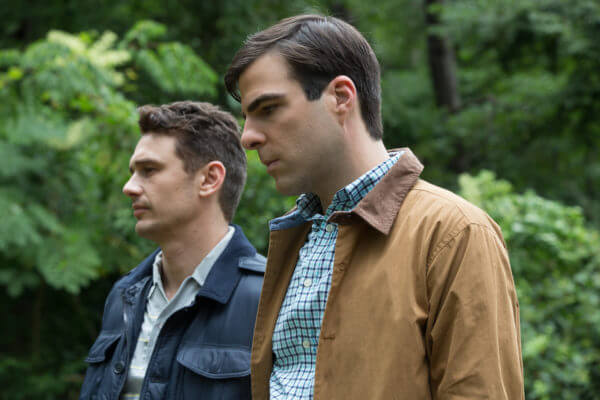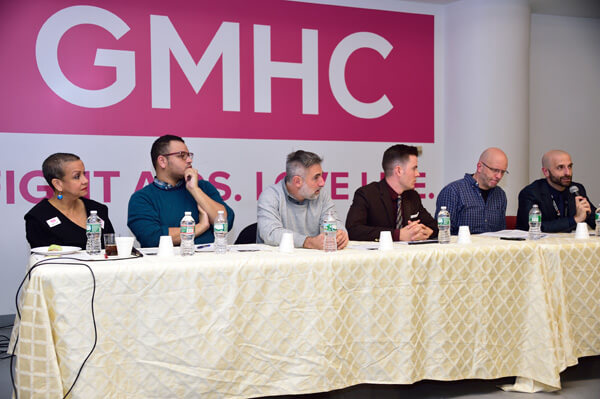If you want to see deconstructive absurdity done right — and believe me, you do — get down to the Lortel to catch Noah Haidle’s existentialist comedy, “Smokefall.” Echoing Thornton Wilder and the poet Gerard Manley Hopkins, the play is a meditation on love, life, risk, and the inevitable sadness, disappointment, and death that come with being alive. It is buoyant, celebratory, melancholy, and quirky — and, as directed by Anne Kauffman with a consistently stellar cast, it is delicately provocative and heartfelt.
The plot skips about in time and tells the story of four generations of a family. Nothing much happens except falling in love, attempting to know oneself, searching for the ineffable sources of our joy and pain, and coming to understand one’s mortality. We see a family uplifted by hope and challenged by dementia, the struggles passed from generation to generation, a couple that even while knowing all love ends chooses to love anyway, and — in a delicious flight of fantasy — a conversation between twins in a womb about the risks of living and whether it’s worth it.
This is the kind of play that propelled the early Off Off Broadway movement, both thematically and structurally, and while many playwrights have tried to ape this style in recent seasons, Haidle gets it right, knowing how to create an organic reality in an absurd situation that allows an audience to feel safe and to comprehend the conceit.
Dysfunction, with bright absurdity, but also tedium
Zachary Quinto serves as a narrator, plays one of the fetuses, and is the grandson of the original couple. He is clearly at home on the stage, and the stakes are high. The success of the play depends on his character setting the right tone for the piece, and he does so brilliantly. Brian Hutchison as Daniel, a father chafing at his home life, and the other fetus has a wonderful gentleness and depth in his performances. Taylor Richardson as Beauty, a teen who turns into a searcher, has amazing confidence and focus in her role, particularly for so young an actor. Robin Tunney as Violet, the mother of Beauty and the twins we see in utero gives a fine and sensitive performance, and Tom Bloom as the Colonel, Violet’s father, and the adult Johnny, his own grandson, is precise, warmly comic, and conflicted.
Archibald MacLeish wrote, “A poem should not mean. But be.” The same could be said of Haidle’s masterful play. It is not the plot or the staging but the cumulative impact of the piece as it unfolds that is so compelling, rare, and welcome.
John Patrick Shanley’s new play “Prodigal Son” might more appropriately be named “Tea and Solipsism.” In it, the author tells the story of his 15-year-old self on scholarship at a private boarding school, who — though a bad actor who stole from classmates, beat up underclassmen, and was indifferent with class work — was in fact a misunderstood genius superior in every way to all around him.
The play is structured as a memory, and Shanley seems to want to cast himself as a Holden Caulfield, but his stand-in character, named Jim Quinn, is just a garden-variety narcissist, rendered even more insufferable by the memoirist’s over-romanticizing of his young self. There is none of the chafing at society or the struggle to discover himself as a man that made Salinger’s anti-hero so classic and relatable. Instead the play moves somewhat aimlessly through selected events in Jim’s two years at the school. None of the characters, including Jim, are drawn with any kind of depth or dimension, so one is left wondering what the purpose of this piece is.
It’s surprising that Shanley, who wrote “Doubt,” could turn out such a lumbering script. He is intent on showing off that he knows the classics; shoehorned into the speeches are references apparently meant to highlight everything that’s fallen out of school curricula in the past half-century.
Worse yet, plot points are obvious and telegraphed. Two teachers argue over whether Jim is an angel or a demon, but the argument doesn’t even come up to the philosophical level of “How Do You Solve a Problem Like Maria?” The teacher who wants to help Jim, Mr. Hoffman, turns out to be gay, but we know this in the first 10 minutes when he admits he isn’t married because he “hasn’t found the right girl.” The line, perhaps plausible in the mid-1960s when the play is set, sounds hackneyed to 2016 ears. Here, the moment seems intended to allow Quinn to make clear he is not gay. Duly noted, Mr. Shanley.
Shanley has opted to direct his own piece, which in this case is probably not the wisest choice. The production plods, and despite the best efforts of the cast they cannot overcome the play’s unfocused and episodic structure. Robert Sean Leonard as Mr. Hoffman has an easy charm that has more to do with his personality than the piece. Likewise, Chris McGarry as the headmaster Carl Schmitt has a strong presence, but the character and his motivations remain unexplored. Timothée Chalamet as Jim also serves as the narrator, but the performance lacks believable conflict. Rather, he seems like a child more in need of a time-out than a play about his life.
Jim’s triumph at the end seems to be that he outlived the people who made him miserable and that they were unhappy when they died. This is hardly the stuff that plays are made of, though it did accurately capture one common high school experience — staring at the clock and waiting for the bell and the release it promised from droning tedium.
In attempting to turn Sam Shepard’s “Buried Child” into a naturalistic, kitchen sink drama, director Scott Elliott undermines the play, missing its entire point. At its core, the play is unrealistic, a quasi-gothic tale that deconstructs the American dream. Ostensibly about a family coming apart at the seams, it explores the dissolution of the institution writ large. The crumbling of society is seen both in the collapse of the family’s farm and in the fall of ultimate taboos like incest. The play is heavy on symbolism and, in trying to force it into realism, this production undermines the artistry of the script and leaves the audience confused. In its structure, it has more in common with Albee and Pinter than Miller or O’Neill. For a production to work, it has to go beyond the literal and be larger than life — just as the so-called American Dream is an outsized fiction people cling to anyway.
This is not a plot-driven piece, though it tells a sketchy story about a drunken man Dodge, his unfaithful wife, their flawed children, a child of incest who was killed and buried in the yard, and the return of a lost son, Vince. This last plot point may or may not be real, and the one successful moment in this production is when Vince forces himself back into the family by slicing through a screen and being symbolically, forcibly born into this group.
The real disappointment is how timely this play could have been today. Hearing politicians scream exhortations to “Make America Great Again” underlines the fracturing of our own social contract, yet so many people seem to embrace the moment as though a dream come true. A better production would have suggested the chilling parallels.
The cast is almost as lost as the director, and they seem to be in different plays. Only Ed Harris, as the patriarch Dodge, and Paul Sparks, as the son Tilden, seem to get what all this is about. Taissa Farmiga is wasted as Shelly, the outsider who arrives with Vince, and Nat Wolff as Vince is merely loud, with no evident motivation. The rest of the company simply go through the motions.
If the New Group was going to bother digging up this play, they really should have done more with it.
SMOKEFALL | MCC at the Lucille Lortel, 121 Christopher St., btwn. Bleecker & Bedford Sts. | Tue.-Wed. at 7 p.m.; Thu.-Sat. at 8 p.m.; Sat. at 2 p.m.; Sun. at 3 p.m. | $49-$99 at ovationtix.com or 866-811-4111 | Two hrs., with intermission
PRODIGAL SON | MTC at New York City Center, 131 W. 55th St. | Tue.-Wed. at 7 p.m.; Thu.-Sat. at 8 p.m.; Wed., Sat.-Sun. at 2 p.m. | $90 at nycitycenter.org or 212-581-1212 | Ninety-five mins., no intermission
BURIED CHILD | The New Group at Signature Theatre Center | 480 W. 42nd St. | Tue.-Fri at 7:30 p.m.; Sat. at 8 p.m.; Sat.-Sun. at 2 p.m. | $27-$107 at ticketcentral.com or 212-279-4200 | One hr., 45 mins., no intermission



































